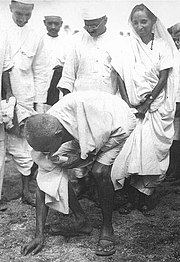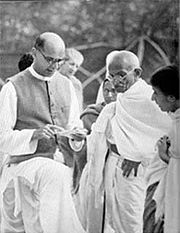 Gandhi stayed out of active politics and, as such, the limelight for most of the 1920s. He focused instead on resolving the wedge between the Swaraj Party and the Indian National Congress, and expanding initiatives against untouchability, alcoholism, ignorance and poverty. He returned to the fore in 1928. In the preceding year, the British government had appointed a new constitutional reform commission under Sir John Simon, which did not include any Indian as its member. The result was a boycott of the commission by Indian political parties. Gandhi pushed through a resolution at the Calcutta Congress in December 1928 calling on the British government to grant India dominion status or face a new campaign of non-cooperation with complete independence for the country as its goal. Gandhi had not only moderated the views of younger men like Subhas Chandra Bose and Jawaharlal Nehru, who sought a demand for immediate independence, but also reduced his own call to a one year wait, instead of two.[36] The British did not respond. On 31 December 1929, the flag of India was unfurled in Lahore. 26 January 1930 was celebrated as India's Independence Day by the Indian National Congress meeting in Lahore. This day was commemorated by almost every other Indian organization. Gandhi then launched a new satyagraha against the tax on salt in March 1930. This was highlighted by the famous Salt March to Dandi from 12 March to 6 April, where he marched 388 kilometres (241 miles) from Ahmedabad to Dandi, Gujarat to make salt himself. Thousands of Indians joined him on this march to the sea. This campaign was one of his most successful at upsetting British hold on India; Britain responded by imprisoning over 60,000 people.
Gandhi stayed out of active politics and, as such, the limelight for most of the 1920s. He focused instead on resolving the wedge between the Swaraj Party and the Indian National Congress, and expanding initiatives against untouchability, alcoholism, ignorance and poverty. He returned to the fore in 1928. In the preceding year, the British government had appointed a new constitutional reform commission under Sir John Simon, which did not include any Indian as its member. The result was a boycott of the commission by Indian political parties. Gandhi pushed through a resolution at the Calcutta Congress in December 1928 calling on the British government to grant India dominion status or face a new campaign of non-cooperation with complete independence for the country as its goal. Gandhi had not only moderated the views of younger men like Subhas Chandra Bose and Jawaharlal Nehru, who sought a demand for immediate independence, but also reduced his own call to a one year wait, instead of two.[36] The British did not respond. On 31 December 1929, the flag of India was unfurled in Lahore. 26 January 1930 was celebrated as India's Independence Day by the Indian National Congress meeting in Lahore. This day was commemorated by almost every other Indian organization. Gandhi then launched a new satyagraha against the tax on salt in March 1930. This was highlighted by the famous Salt March to Dandi from 12 March to 6 April, where he marched 388 kilometres (241 miles) from Ahmedabad to Dandi, Gujarat to make salt himself. Thousands of Indians joined him on this march to the sea. This campaign was one of his most successful at upsetting British hold on India; Britain responded by imprisoning over 60,000 people.The government, represented by Lord Edward Irwin, decided to negotiate with Gandhi. The Gandhi–Irwin Pact was signed in March 1931. The British Government agreed to free all political prisoners, in return for the suspension of the civil disobedience movement. Also as a result of the pact, Gandhi was invited to attend the Round Table Conference in London as the sole representative of the Indian National Congress. The conference was a disappointment to Gandhi and the nationalists, because it focused on the Indian princes and Indian minorities rather than on a transfer of power. Furthermore, Lord Irwin's successor, Lord Willingdon, began a new campaign of controlling and subduing the nationalist movement. Gandhi was again arrested, and the government tried to negate his influence by completely isolating him from his followers. But this tactic failed.
In 1932, through the campaigning of the Dalit leader B. R. Ambedkar, the government granted untouchables separate electorates under the new constitution. In protest, Gandhi embarked on a six-day fast in September 1932. The resulting public outcry successfully forced the government to adopt a more equitable arrangement via negotiations mediated by the Dalit cricketer turned political leader Palwankar Baloo. This was the start of a new campaign by Gandhi to improve the lives of the untouchables, whom he named Harijans, the children of God. On 8 May 1933, Gandhi began a 21-day fast of self-purification to help the Harijan movement.[37] This new campaign was not universally embraced within the Dalit community, as prominent leader B. R. Ambedkar condemned Gandhi's use of the term Harijans as saying that Dalits were socially immature, and that privileged caste Indians played a paternalistic role. Ambedkar and his allies also felt Gandhi was undermining Dalit political rights. Gandhi, although born into the Vaishya caste, insisted that he was able to speak on behalf of Dalits, despite the presence of Dalit activists such as Ambedkar.
In the summer of 1934, three unsuccessful attempts were made on Gandhi's life.
When the Congress Party chose to contest elections and accept power under the Federation scheme, Gandhi resigned from party membership. He did not disagree with the party's move, but felt that if he resigned, his popularity with Indians would cease to stifle the party's membership, that actually varied from communists, socialists, trade unionists, students, religious conservatives, to those with pro-business convictions and that these various voices would get a chance to make themselves heard. Gandhi also wanted to avoid being a target for Raj propaganda by leading a party that had temporarily accepted political accommodation with the Raj.[38]
Gandhi returned to active politics again in 1936, with the Nehru presidency and the Lucknow session of the Congress. Although Gandhi wanted a total focus on the task of winning independence and not speculation about India's future, he did not restrain the Congress from adopting socialism as its goal. Gandhi had a clash with Subhas Bose, who had been elected president in 1938. Their main points of contention were Bose's lack of commitment to democracy, and lack of faith in non-violence. Bose won his second term despite Gandhi's criticism, but left the Congress when the All-India leaders resigned en masse in protest of his abandonment of the principles introduced by Gandhi.[39]

No comments:
Post a Comment